Katie Arnstein On Making a Solo Show
Waiting by the phone for that life-changing call is normality for most actors. Sadly, for the 98% who don’t make a living from acting, that call will never come. Finding some self-determination in this industry isn’t easy but one of the best ways to take control of your career is to make your own work. And few do that better than actor, writer and theatre maker Katie Arnstein.
Described as ‘Primed for greatness’ (The Guardian) and ‘The voice of several generations’ (Emma Burnell), Katie has made her name writing and performing solo shows. Her work includes the multi-award-winning storytelling trilogy It’s a Girl!, The Long Run (New Diorama Theatre), and Wolverine Woman (BBC) starring Olivia Swann.
Katie is a master storyteller who delivers heartfelt humanity wrapped in razor-sharp wit. With extensive experience growing her ideas into fully-fledged productions for stage and screen, I asked Katie to shed some light on the world of solo performance.
Have you always been a writer?
I don’t think so. I remember being alright at English at school. At drama school I absolutely didn’t think I could write; it wasn’t really a part of the syllabus. Becoming a writer came out of a frustration with not getting the parts or even the auditions for things I wanted to do.
You come out of drama school and you’re like “Okay, let’s go! What is there?” And for me, it was total tumbleweed. I drove around garden centres in the North with a pantomime for way less than minimum wage, and I played a silent role in an unpaid show that rehearsed for three weeks, which was a ridiculous loss of money. Mainly I was doing unpaid gigs just to get credits on the CV. At drama school, you often have the chance to be cast against type. The real world that I found myself in was very different. I had an agent shake my hand and say “Okay, you’re five foot seven…You’re a bit tall to be a woman. What are you going to do?” And I was like “Oh, I guess…chop off my legs?” What can I do with that? I suppose he was saying “You’re too tall to play a romantic lead so what can we do with you?”
It was bad! And, I mean, I’m very aware of my privilege; I’m white, I’m English speaking, there were a lot of rooms that I could walk into but it was way narrower than I was anticipating.
I did a theatre in education show that was written and directed by a white male in his seventies and one of the parts I was playing was a mum. I got into a debate with him because I didn’t want to wear an apron and he said “How is anyone going to know that you’re a mum if you don’t wear the apron?” And I thought, if this guy can write a show, I can write a show.
So writing, for me, came out of that frustration and just being totally gobsmacked that people had these set rules about what women should be on stage, and I wanted to add a voice contributing to the opposite. I wanted to actually say something for a bit. And that’s how it started for me.
What inspires the themes explored within your work?
When I first started, the MeToo movement was gaining prominence, Trump was looking likely to win the election (as he went on to do), and it felt like a fiery time to be a left-leaning person; to be a woman in the arts; to be somebody who wanted to say something. What inspired me were real-life events.
Bicycles and Fish started with real things that happened to me at school. Sexy Lamp started with real things that happened to me as an actor. Sticky Door began with real things that happened to me as a woman dating and exploring my sexuality. And then The Long Run, which is my newest show, started with a real event, which was my mum’s bowel cancer diagnosis, but then I wanted to challenge myself and make up a story to see if I could. My experience of cancer was quite a positive one – my mum was diagnosed, they caught it early, she went through a very aggressive treatment but she’s now fine and brilliant. And I wanted to celebrate everybody who’s had harsher journeys and so it had to be made up.
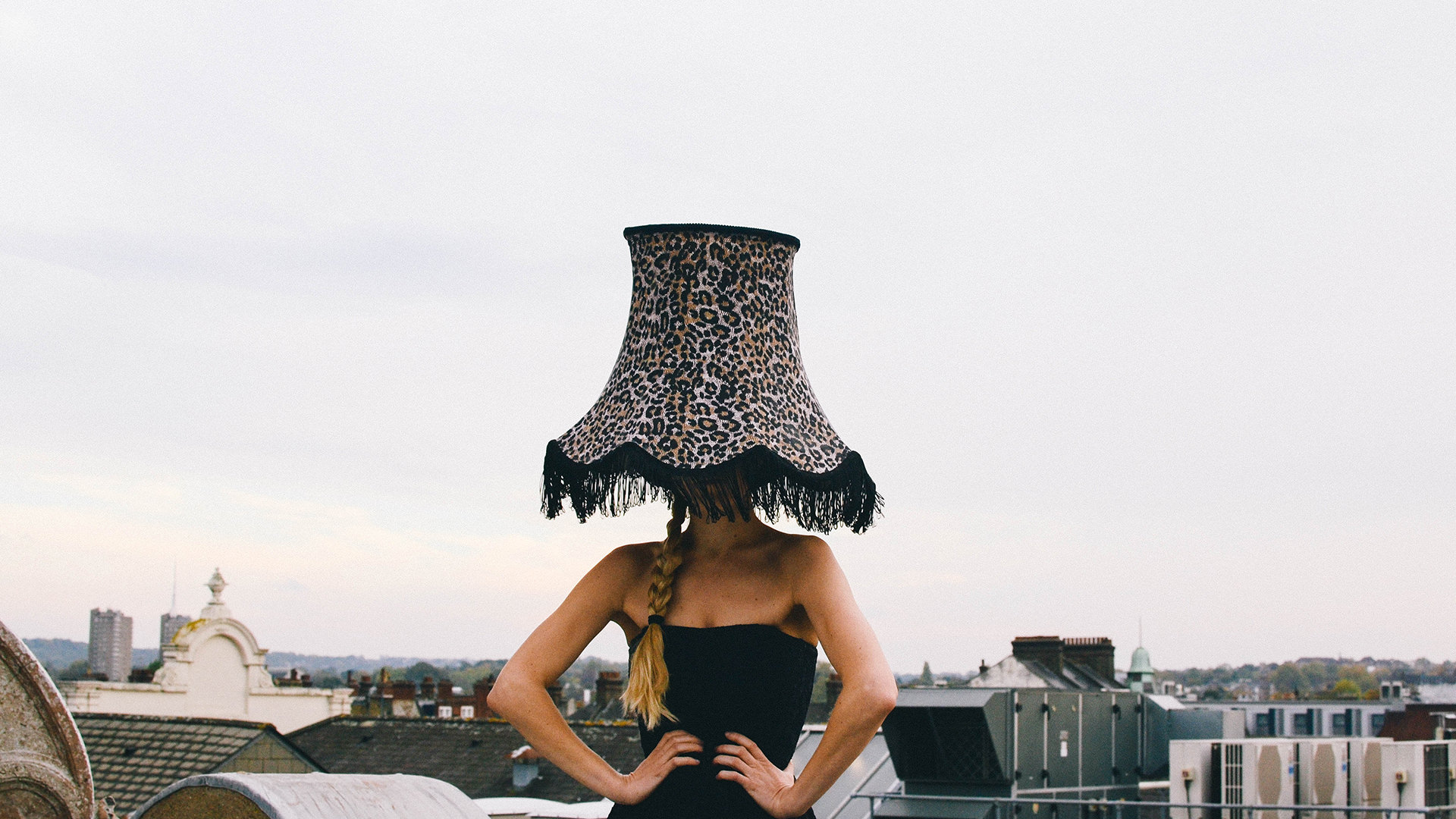
Katie Arnstein artwork for Sexy Lamp (photography by Simon Jefferis)
How do you approach the challenge of telling a story on stage on your own?
There are different ways of doing it and I’m inspired by a lot of solo artists. Chewing Gum Dreams by Michaela Cole was fantastic; I love Josie Long, she’s more stand-up but tells stories; Hannah Gadsby with Nanette; Daniel Kitson; brilliant solo storytellers who all do it differently. I’ve been very inspired by them and taken the things that work for me. I’ve never been good at accents, I’ve never been very transformative, so I was like, “Okay, let’s make that work to my advantage.” Let’s start the show by going “Hello, I’m Katie, and I’m going to tell you a story.” Let’s make everyone feel safe. Let’s make sure everyone knows what this show’s going to be.
I think my work sits between standup and storytelling. I try to bring a one-on-one feeling into my shows which takes the pressure off me having to be transformative too. It’s just about me telling a story to you. I like the lights up on the audience. I like to look everybody in the eye. And one of the other things I do for every show is that I give everybody a sweet at the start. When I first started out I was so nervous, I was a wreck, and I still get nervous every show but the sweets allow me to meet every audience member, say “Hello, thank you for coming” and give them something as a thank you. Even if they don’t like the show we’ve had an exchange that’s very human.
One of the downsides of doing solo work is it can feel very lonely and so it’s about making that connection happen with the audience. For me, making a solo show is about making the audience the other person that you’re working with. It’s important that they feel part of it, which means every show is different.
Once you have a show, how do you go about pitching it to theatres?
It’s a real slog and it is a different set of skills. In terms of looking for places to put on a solo show, I’d recommend any scratch nights, any open mic nights; I’d be looking at the BBC Writers opportunities page; the Camden Fringe for people who are based in London; the Brighton Fringe. Edinburgh Fringe is a pretty expensive venture and it’s a hard place to begin because of the costs, but it’s a brilliant festival to be a part of if you’re lucky enough to be able to afford it.
Those are great grounds for developing and then in terms of pitching to theatres, it’s about inviting people along to your work. If they can’t make the first one then just send them another email and invite them to the second. I’m a real believer in making yourself known to people and trying again. Don’t think that if they don’t come to the first show that you do, they won’t come to the second thing that you’ve written.
Who do you invite to come and see your work?
Great bloody question. I would say you want to invite programmers from theatres. If you’re looking for a writing agent you want to send the script to them and send them an invitation.
Usually, a lot of regional theatres have email addresses on their website. It can often feel daunting trying to get people in; I still feel that. Sometimes it’s just about going okay, I’m going to give this a shot. I’m going to send twenty emails, maybe I’ll get no replies, maybe I’ll get one reply. Maybe they won’t reply this year but the second time I write to them they’ll go, “Yeah, this person, I remember them.”
Invite people from theatres, particularly regional theatres, invite programmers, invite directors of shows that you love, write to TV production companies. There’s no harm in writing to Red Planet Productions or STV saying, “I love your work, maybe you will like mine?”
Invite people that you want to work with whose work you believe in and that’s where the real collaboration is going to come through. If you like their work and they like yours, it’s a match made in heaven.
You mentioned that you’re working with a producer now. How has that changed things for you?
I’m working with Grace from Grace Dixon Productions who’s come on board for this iteration of The Long Run. What she’s done so beautifully and carefully is made it so that Bec Martin (the director) and I can get to go back to being the writer, performer and director. We are still a part of the creative decisions but we’re not inviting people to the show anymore, which is remarkable. We’re not the people who are finding our sound or lighting designer. Emotionally it’s an absolute delight because it means I now get to think about relearning the script or being off-book by the start of rehearsals instead of working out where we’re going to book the rehearsal space.
A producer is a phenomenal thing to have if you can get it and if you’re in a position where you feel you’d like to go back to being just a creative role. The big jump for me happened when I got Arts Council funding which enabled me to pay a producer. It’s super competitive but it’s absolutely worth a try. If you need access support, Arts Council England offer to pay somebody to write or develop your application with you. You can contact ACE via email and say “I need access support because of these reasons. I need someone to co-write my bid. I’d like X to write my bid. Their fee is £200 per day and it will take three days.” You as the artist still have to do a lot of the work, of course, but you have someone on your side who knows and understands how ACE works. It’s an opportunity that not many people know about.
Having never heard of ACE access support myself, I wanted to find out who it’s available for. I couldn’t find any specific eligibility criteria on the ACE website, however, further googling suggests that the scheme is open to anyone who needs it due to ‘neurodiversity, dyslexia, form-filling anxieties, or mental health challenges from the application process’ (Disconnected Bodies).
https://www.artscouncil.org.uk/access-support
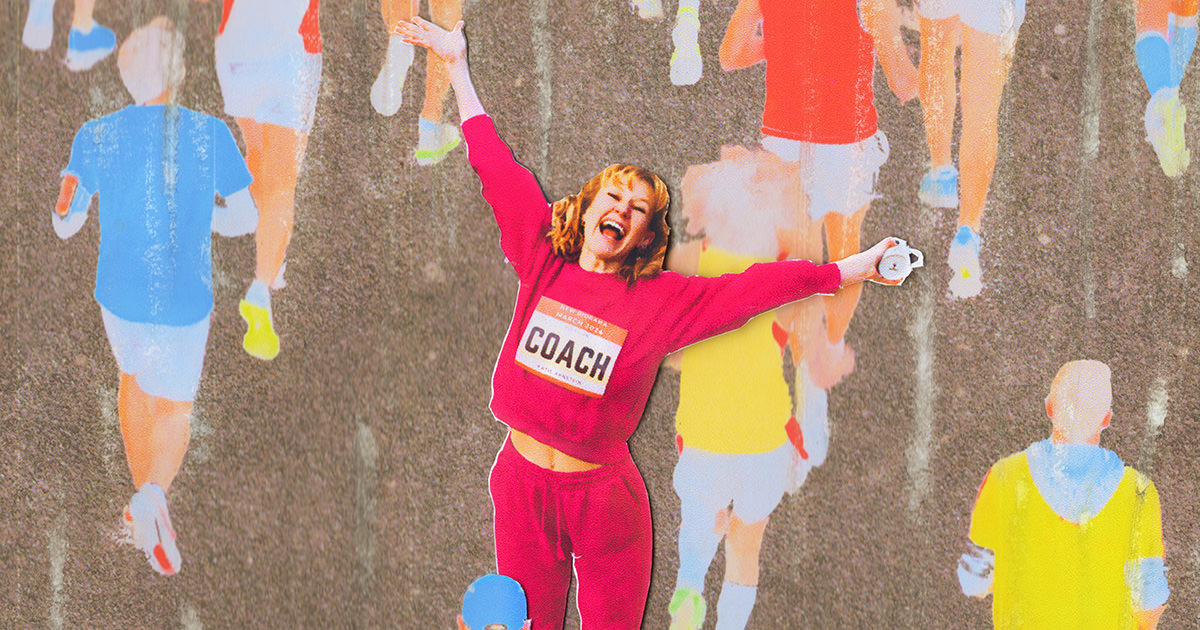
Katie Arnstein artwork for The Long Run (photography by Guy Sanders)
What are the demands of a solo show for an actor and how do they differ from more conventional theatre?
As the writer and performer, I vividly remember thinking, “God, who do I blame? Where can I point the finger now?” You’ve really got to believe in it, you’ve got to stand by it, because it’s only you doing it. You’re on your own.
I still feel vulnerable. I don’t know if you’ve ever frozen on stage before – I’ve only done it a couple of times – but when you’re on your own, it’s like when you’re climbing the stairs and you think there’s an extra step and you plunge down. I couldn’t believe how lonely that felt on stage.
It’s incredibly demanding in that sense but what I learned slowly is that the audience is not there to trip you up and they aren’t there to hate what you’re doing. They’re on your side from the start. So it got less of a demand for me to get all the lines perfect and more of a demand for me to make the audience feel safe and feel that they were in good hands.
How did Wolverine Woman come about?
Wolverine Woman is the first thing that I’ve written for television and it was through a brilliant BBC scheme called The Break which takes new writers and puts their work on screen for the first time.
I wanted to highlight the madness of being a woman and navigating the world, and how at brownies you can learn about self-defence on the same day you choreograph a Spice Girls dance. How at secondary school the women in my year had a period and safety talk whilst the boys watched Batman in the sports hall. Hopefully Wolverine Woman brings attention to that madness and raises a bit of a debate.
I’d recommend everyone have a look into The Break. I came across it through the BBC Writers page. They have phenomenal opportunities; some of them are regional, some of them are open to applications from across UK.
https://www.bbc.co.uk/writers/opportunities/
How important is making your own work in today’s industry?
It’s really important, not just to get different voices into the arts, not just to tell different stories – I’m so sick of seeing theatres put on the same stories by the same writers – but also for the audiences. I really believe that drama and comedy can have a real effect on the world around it. Most recently we saw that with Mr Bates vs The Post Office which inspired public outrage for the scandal.
I believe that there needs to be more support to get people from working classes, from different socioeconomic backgrounds, from the global majority, into storytelling and into the arts because that is where the best work is. It comes from as much variety and as much diversity as possible.
I would encourage people to have confidence to tell their stories or a story that they want to tell – it doesn’t have to be autobiographical at all. Take up space, it’s yours, you deserve it.
What advice would you give to actors interested in making a solo show?
What I would say is make sure you’ve got things in place to look after yourself – and I’m giving this advice from someone who has absolutely never put those things in place. I think give yourself breaks. Make sure that you work in a way that is conducive to you. Work out what times of day you work best.
I was given a phenomenal piece of advice by John Britten, who’s an amazing writer and director. I remember texting him when I was writing Sexy Lamp and I was like, “Jonathan, it’s going very badly.” And he said, “Have you written a review of your piece? Write a review of Sexy Lamp. Write the best review that you could possibly receive.” And by doing that, you give yourself something to aim for. You give yourself a structure of what you want the show to be. You give yourself loads of positive adjectives that you then start to absorb, and it gives you a blueprint of how to write the show.
It can feel incredibly lonely, so ask for help, ask for advice, and give yourself opportunities to fail safely and to try again. I’ve had advice from so many people and if there’s anybody who wants to get in touch with me or has any questions, I’d be more than happy to help. I really mean that, if there’s anything I can do to support other people on their journey, I’d love to.
Honestly, it can be really fucking hard but the wins available are remarkable, and what a privilege to be able to write something that you fully believe in and share it with people.
What’s next?
Coming up next I’ve got a London run of my newest show, The Long Run. It’s on at the New Diorama from the 29th of March to the 13th of April. Tickets are available now. I’ve got big hopes for this show. We’re in talks about taking it to Edinburgh. We’re in talks with theatres to try and tour it regionally. I’m working on a spec script, a TV ‘episode one’ of The Long Run with hopes to send that to production companies to see if they’re interested. I’m aiming big!
I find writing quite challenging; I don’t feel like it just falls out of me. I really work at it to get something that I love and then once I have, why not try and take it as far as you can to as many people as you can? So we’re going to see how far we can go.
If you’d like to find out more about Katie and what she’s up to, check out her website https://katiearnstein.com/
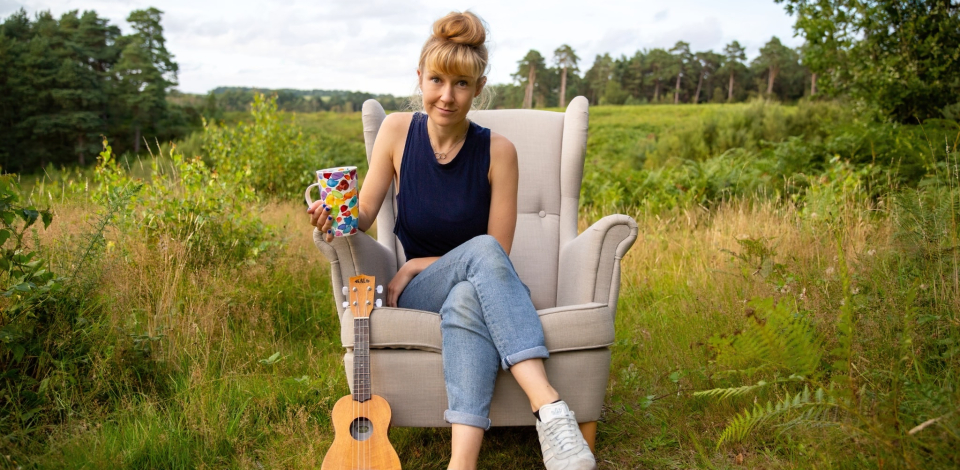 Image by Harrison Bates
Image by Harrison Bates

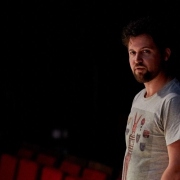
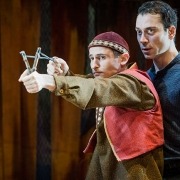

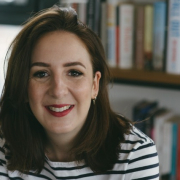









Leave a Reply
Want to join the discussion?Feel free to contribute!